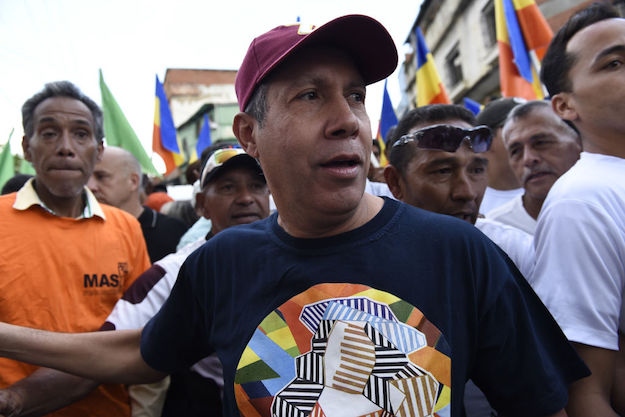Venezuela’s presidential elections, now set for May 20, are designed to help President Nicolás Maduro tighten his grip on power. Originally scheduled for late 2018, the administration brought forward the date of the election in a clear effort to capitalize on disharmony within the opposition.
After getting trounced in October in provincial elections that were widely seen as fraudulent, most members of the opposition MUD coalition have decided not to participate in the coming contest. The government’s willingness to stuff ballots, break electoral rules and limit opposition voters from reaching the polls means there is almost no risk of Maduro losing.
But four opposition candidates, three from small parties and one independent, have nonetheless thrown their hats into the ring. Most prominent among them is Henri Falcón, a retired military officer and former Chavista politician who broke with the government and joined the opposition in 2010.
Falcón has chosen to run despite the fact that Maduro will do anything to keep power and that the MUD is putting its weight behind a strategy that will discourage opposition supporters from voting. The deck is stacked against him, so what could Falcón possibly hope to gain by running? Here are two hypotheses, both of which point to the lingering uncertainty over who will be able to pull the opposition out of its current morass.
The first is that Falcón actually thinks he can win. The thought seems laughable, for several reasons.
According to our polling at Delphos, some 55 percent of Venezuelans who want a change in government say they won’t go to the polls to try to make it happen. They are convinced, with more than a little justification, that the coming election will be manipulated by the government to the point that their participation would be meaningless. Furthermore, many have lost their faith in opposition leadership.
Given this rate of abstention, even if the election was somehow free from government meddling, it would still be very close. If held today, both Maduro and Falcón could expect around 5.5 million votes.
Of course, the election won’t be free or fair. In the last two years – and in recent, fruitless negotiations with the opposition in the Dominican Republic – the regime has clearly shown it is unwilling to give up power through democratic means. It has taken full control of the electoral system, places obstacles in front of opposition voters, and will break any rule necessary needed to ensure victory.
Moreover, Falcón doesn’t have the organization needed to take on the regime. His Progressive Alliance party is a regional organization with little or no presence in the majority of states in the country. The two other minority parties that support him, COPEI and MAS, won’t do much to change that fact. Without an extensive, nationwide network of electoral observers, Falcón’s ability to defend the vote is minimal.
Finally, the MUD coalition is itself promoting abstention, further diminishing the likelihood that voters will turn out in sufficient numbers to affect the outcome.
Falcón surely knows all of this. If he really does believe he can win, then, it is likely because he thinks that his candidacy will somehow change the conditions on the ground.
Over the last three decades, Falcón has managed to navigate both government and opposition currents without ever being fully part of either. He was a supporter of the late Hugo Chávez during the earliest days of his presidency, and as a federal deputy helped draft the 1999 constitution. He went on to become a Chavista mayor and governor in Lara state, but remained a popular regional figure rather than an icon of the revolution. When he broke to the opposition, Falcón similarly maintained a moderate profile. He was Henrique Capriles’ campaign manager in the presidential race in 2013, but is nevertheless seen as apart from the infighting that has hindered MUD leadership in recent years.
As a result, Falcón may believe that more powerful opposition currents may be lured to support him as a consensus-building option that could help forge a path forward. He may even hope that, if he can show some signs of popular support, the MUD will change its position on the election and try to get out the vote to support him.
Nothing is impossible. But especially given the current, divided state of the opposition, this eventuality seems highly unlikely.
A second and more likely hypothesis is that Falcón sees his candidacy as an opportunity to boost his standing among opposition supporters and, following the election, become a more prominent leader in resistance to the Maduro government.
If Falcón is able to attract some popular support in the early days of his campaign – and perhaps lure new allies from within the MUD to his cause – then he may even have a chance of accomplishing this goal. Consider, too, that Maduro’s government may doctor the vote count to inflate turnout on both sides in an effort to lend a veneer of credibility to the result. That type of maneuvering could have the odd effect of benefiting Falcón as he presses his case for opposition leadership.
Of course, Falcón’s motivations may be more complicated than these hypotheses allow. On one hand, it is possible that both are true: he may think he can win and view stock in leadership circles as a second-best result. On the other hand, internal battles within the opposition are not always what they appear.
But regardless, Falcón’s decision to run – and the opposition’s response – could radically change the political aspect of Venezuela’s crisis. If the opposition takes a wrong step in the weeks ahead, the definitive radicalization of the regime, and its ever-firmer grip on power, could leave any hope of democratic transition out of reach for the foreseeable future.
—
Seijas Rodríguez, Ph.D., is a Venezuelan political analyst and statistician. He is the director of the Delphos poll.









